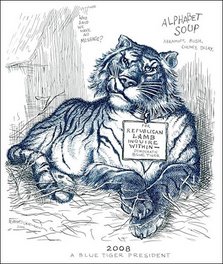 When Religion is an Addiction
When Religion is an AddictionI remember hearing popular psychological speaker and writer John Bradshaw say that the “high” one gets from being righteous was similar to the high of cocaine. As both a former monk and addict, he knew the feelings personally.
As the religious right pushes its anti-gay, anti-women’s reproductive rights, anti-science, pro-profit agenda nationally and in state capitals across the nation and wins, that high is a sweet fix for the addicted. It gives them a comforting feeling of relief that they’re really right, okay, worthwhile, and acceptable.
...Like all fixes, though, it doesn’t last. So, the addict is driven to seek another and another – another issue, another evil, another paranoiac threat to defeat. It can’t ever end. Like the need for heavier doses, the causes have to become bigger and more evil in the addict’s mind to provide the fix.
This mind-altering fix of righteousness covers their paranoid shame-based feelings about the internal and external dangers stalking them. The victim-role language of their dealers, right-wing religious leaders, feeds it. Like alcoholism and drug addiction, the fix numbs the religious addict against any feelings about how their addiction affects others...
If you’re an enabler or the addict yourself, the above must sound over the top. You’d prefer to deny or soften the reality of the addiction...
Addicts reinforce each other. Fundamentalist religious organizations and media are their supportive co-users. So the person who deals with someone’s addiction cannot do it alone. They must have support from others outside the addiction...
You can’t argue with an addict...
You can’t buy into the addict’s view of reality...
Never say, even to reject it or with “so-called” before it: “partial-birth abortion,” “gay rights,” “intelligent design,” “gay marriage,” etc...
Don’t let the addict get you off topic...
Never argue about whether sexual orientation is a choice...
Never argue about sex...
It’s okay to affirm that you don’t care or these aren’t the issues. You don’t need to justify your beliefs to a drunk or druggie...
Get your message on target and repeat it...
Don’t nag addicts...
Don’t accept that the addiction needs equal time...
Model what it is to be a healthy human being without the addiction. Addicts must see people living outside the addiction, happy, confident, proud, and free from the effects of the disease. In spite of the fact that we’re a nation that supports both substance and process addictions so people don’t threaten the institutions and values that pursue profits over humanity, live as if that has no ultimate control over you.
Don’t believe that you, your friends, children, relationships, hopes, and dreams, are any less valuable or legitimate because they aren’t sanctioned by a government, politicians, or religious leaders that are in a coping, rather than healing, mode of life.
Dealing with addictions takes an emotional toll on everyone. Yet, recognizing religious addiction as an addiction demystifies its dynamics and maintains our sanity.
This is an excellent primer for talking to the religious-addicted. Please link and read the complete article (which is part of a soon-to-be released book).
If you've ever been through addiction recovery, you'll recognize most of the "empowering ways" to speak to the addict. If you have been lucky enough to escape the curse of addiction (chemical and otherwise), you can still appreciate how important it is to set up and maintain the conversation, and keep YOUR focus on THEIR problem. If you even once sound sympathetic and/or defensive, you've lost your power. End the encounter immediately. That allows you to come back later, having shown your control of the issue by walking away from it on your terms. It's not complicated but it requires self-control.
Reminder: "Model what it is to be a healthy human being without the addiction. Addicts must see people living outside the addiction, happy, confident, proud, and free from the effects of the disease."
(Dr. Minor is a Professor of Religious Studies at the University of Kansas. Through his Fairness Project, he is an advocate for, and lecturer on, LGBT issues.)
(First posted at God is for Suckers!)



No comments:
Post a Comment